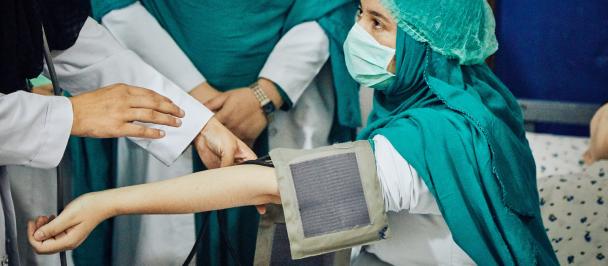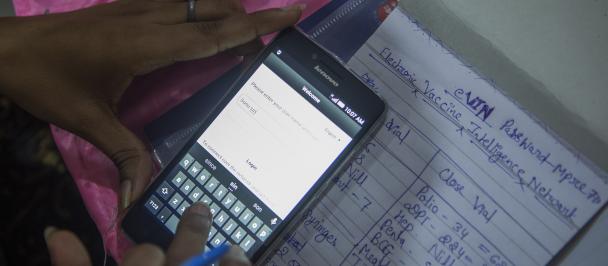Statement at the Access Challenge – Universal Health Coverage (UHC) Conference: Conference: High-Level Awards Ceremony and Dinner
The Access Challenge – Universal Health Coverage (UHC) Conference
September 24, 2018
As prepared for delivery.
It is my pleasure to join you all tonight to discuss how we can make universal health coverage a reality.
At UNDP, we believe that universal health coverage (UHC) is key to unlocking progress toward many of the Sustainable Development Goals – for example on economic growth, fighting poverty and advancing equalities, especially gender. Health is a precondition, indicator and an outcome of development; we simply cannot achieve any of these goals without accelerating progress toward universal health coverage.
Universal health coverage is a smart investment. Between 2015 and 2030 an estimated US$ 11.2 trillion will be lost in economic output from low- and middle-income countries due to avoidable deaths. Those are preventable if effective and timely health care were available. The estimated US$ 370 billion a year needed to advance UHC to reach the health-related SDGs by 2030 is an investment we cannot afford not to make.
I am encouraged by the global momentum we now see, which is greater than ever before. Beyond commitments under the 2030 Agenda, we recognize and support renewed commitments to strengthen primary health care, the outcomes of the high-level meetings on tuberculosis and non-communicable diseases, and the conviction that strong health systems are urgently needed to drive progress on the challenges we face in the 21st century.
I believe the question we now face is not “if,” but “when.” While governments around the world have committed to making universal health coverage a reality, there is still a long way to go, with half the world’s people lacking access to essential health services.
While universal health coverage is a complex challenge, which requires political buy-in, commitment and a solid financing strategy, let me emphasize three ways to capitalize on the significant opportunities presented by new medicines and health technologies.
First, new tools and technologies must be people-centered. Earlier this evening, we heard from Dr. Chris Elias how existing data on primary health care doesn’t give governments the information they need to drive targeted improvements. New tools and technologies can help us measure what matters most to people on the ground. UNDP is working with the Government of India, and other governments around the world, to roll out eVIN – an electronic vaccine intelligence network that provides frontline health workers and health systems managers with real-time information on vaccine availability. In India, we have already seen that eVIN has helped health system managers identify gaps in access to lifesaving vaccines and course correct to ensure full coverage. We must ensure that new technologies benefit the poorest people first – the essence of leaving no-one behind.
Second, development partners and donors must help countries strengthen their capacities to deliver health technologies. I applaud Ms. Campana and President Kikwete for their commitments to building support for universal health coverage at the highest levels of government. Development partners and donors can help countries translate this political will into reality by helping them build strong, sustainable systems for health. For example, the UNDP-led Access and Delivery Partnership – a partnership with WHO, PATH and the WHO-hosted Special Programme for Research and Training in Tropical Diseases – is supporting countries to develop the technical expertise, human resources and other capacities needed to deliver lifesaving health technologies to the people who need them the most. Through the Access and Delivery Partnership and other related initiatives, UNDP is committed to ensuring that our efforts help build sustainable and resilient systems for health.
Third, we must forge stronger global partnerships to tackle systemic barriers that prevent health technologies from reaching the people who need them most. High prices and inefficient procurement and supply chains often mean that lifesaving medicines, vaccines, diagnostics and other health technologies are not accessible to the people who need them. I am excited for UNDP’s new collaboration with the Government of Japan, the Access and Delivery Partnership and the GHIT Fund to build new global partnerships around innovation, access and delivery in the years ahead. We are committed to working with innovators, access platforms and donors from around the world to identify solutions to promote access to lifesaving health technologies.
We are also collaborating with the UN system to ensure that people around the world get the health care they need and deserve. For example, we are working closely with Dr. Tedros and his team at WHO to improve the awareness across different sectors of the opportunities to tackle non-communicable diseases, financing options, and the costs of not doing so. We are working with the Global Fund on the delivery of essential health services in fragile and conflict-affected settings, as part of our commitment to ensure that people living in some of the world’s most challenging settings aren’t left behind. I am confident that by scaling up partnerships like these that we can dramatically improve the quality of and access to health services around the world.
I look forward to working with all of you to accelerate progress toward universal health coverage and ensure that no one is left behind.

 Locations
Locations

